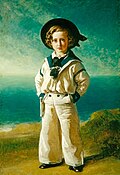Edward VII
Edward VII (Albert Edward; 9 November 1841 – 6 May 1910) was King of the United Kingdom and Emperor of India from 1901 until his death in 1910.
| Edward VII | |||||
|---|---|---|---|---|---|
 Portrait by W. & D. Downey, 1900s | |||||
| 22 January 1901 – 6 May 1910 | |||||
| 9 August 1902 | |||||
| Imperial Durbar | 1 January 1903 | ||||
| Predecessor | Victoria | ||||
| Successor | George V | ||||
| Born | 9 November 1841 Buckingham Palace, London, England | ||||
| Died | 6 May 1910 (aged 68) Buckingham Palace, London, England | ||||
| Burial | 20 May 1910 Royal Vault, St George's Chapel, Windsor Castle
| ||||
| Spouse | |||||
| Issue Detail | |||||
| |||||
| House | Saxe-Coburg and Gotha | ||||
| Father | Prince Albert of Saxe-Coburg and Gotha | ||||
| Mother | Queen Victoria | ||||
| Religion | Protestant | ||||
| Signature | Edward VII's signature | ||||
| Education | |||||
Edward was born Albert Edward and was the eldest son of Queen Victoria and Prince Albert. He was Prince of Wales and heir apparent for longer than any other person up until that time until surpassed by his great-great grandson King Charles III. In his younger years as Prince of Wales, he was known as a playboy and popularized many trends in fashion and also had many mistresses.
Biography
Edward VII was the father of George V and grandfather of Edward VIII and George VI. He is also the great-grandfather of the late queen, Elizabeth II and great-great grandfather to Charles III. There are a number of statues of Edward VII around the British Isles and Commonwealth realms.
Edward was given a grand state funeral with the largest gathering of royalty taken place anywhere in the 20th century. It included Wilhelm II, the Kaiser of the German Empire, who would later be at war with Britain and Nicholas II, the Tsar of the Russian Empire, as well as many others. For the first time in royal history, Edward lay in state for the people to pay their last respects, a reflection of his immense popularity.
Edward was king for only nine years but made a lasting impression. He became increasingly popular with his people and was credited as a peacemaker for his work in maintaining world stability at a time when war seemed to be looming. He died at the age of 68 in 1910. Four years later, the peace he worked so hard to keep was broken with the start of World War I (1914–1918).
Edward VII Media
Portrait by Franz Xaver Winterhalter, 1846
Edward and his entourage at Niagara Falls, 1860
- Princess Alexandra of Denmark and the Prince of Wales engagement photograph.jpg
Edward and Alexandra, 1863
- WeddingEA.jpg
Edward and Alexandra on their wedding day, 1863
- London Bridge on the Night of the Marriage of the Prince and Princess of Wales.jpg
- Edward, Prince of Wales, with elephant, Terai cph.3b08927.jpg
Edward (front left) in India, 1875–76
- Royal family group.jpg
Edward (right) with his mother (centre); his niece Empress Alexandra of Russia (far left); her husband, Tsar Nicholas II; and their daughter Olga, 1896
Portrait by Sir Luke Fildes, 1901
Caricature in Puck magazine, 1901
Relaxing at Balmoral Castle, photograph by Queen Alexandra
Funeral procession of Edward VII, London, 1910
Other websites
 Media related to Edward VII at Wikimedia Commons
Media related to Edward VII at Wikimedia Commons Quotations related to Edward VII at Wikiquote
Quotations related to Edward VII at Wikiquote- File:Wikisource-logo.svg Works related to Edward VII at Wikisource

